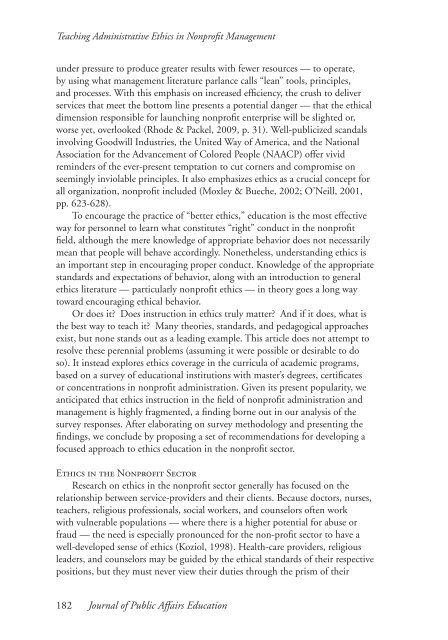JOURNAL OF PUBLIC AFFAIRS EDUCATION - Naspaa
JOURNAL OF PUBLIC AFFAIRS EDUCATION - Naspaa
JOURNAL OF PUBLIC AFFAIRS EDUCATION - Naspaa
You also want an ePaper? Increase the reach of your titles
YUMPU automatically turns print PDFs into web optimized ePapers that Google loves.
Teaching Administrative Ethics in Nonprofit Managementunder pressure to produce greater results with fewer resources — to operate,by using what management literature parlance calls “lean” tools, principles,and processes. With this emphasis on increased efficiency, the crush to deliverservices that meet the bottom line presents a potential danger — that the ethicaldimension responsible for launching nonprofit enterprise will be slighted or,worse yet, overlooked (Rhode & Packel, 2009, p. 31). Well-publicized scandalsinvolving Goodwill Industries, the United Way of America, and the NationalAssociation for the Advancement of Colored People (NAACP) offer vividreminders of the ever-present temptation to cut corners and compromise onseemingly inviolable principles. It also emphasizes ethics as a crucial concept forall organization, nonprofit included (Moxley & Bueche, 2002; O’Neill, 2001,pp. 623-628).To encourage the practice of “better ethics,” education is the most effectiveway for personnel to learn what constitutes “right” conduct in the nonprofitfield, although the mere knowledge of appropriate behavior does not necessarilymean that people will behave accordingly. Nonetheless, understanding ethics isan important step in encouraging proper conduct. Knowledge of the appropriatestandards and expectations of behavior, along with an introduction to generalethics literature — particularly nonprofit ethics — in theory goes a long waytoward encouraging ethical behavior.Or does it? Does instruction in ethics truly matter? And if it does, what isthe best way to teach it? Many theories, standards, and pedagogical approachesexist, but none stands out as a leading example. This article does not attempt toresolve these perennial problems (assuming it were possible or desirable to doso). It instead explores ethics coverage in the curricula of academic programs,based on a survey of educational institutions with master’s degrees, certificatesor concentrations in nonprofit administration. Given its present popularity, weanticipated that ethics instruction in the field of nonprofit administration andmanagement is highly fragmented, a finding borne out in our analysis of thesurvey responses. After elaborating on survey methodology and presenting thefindings, we conclude by proposing a set of recommendations for developing afocused approach to ethics education in the nonprofit sector.Ethics in the Nonprofit SectorResearch on ethics in the nonprofit sector generally has focused on therelationship between service-providers and their clients. Because doctors, nurses,teachers, religious professionals, social workers, and counselors often workwith vulnerable populations — where there is a higher potential for abuse orfraud — the need is especially pronounced for the non-profit sector to have awell-developed sense of ethics (Koziol, 1998). Health-care providers, religiousleaders, and counselors may be guided by the ethical standards of their respectivepositions, but they must never view their duties through the prism of their182 Journal of Public Affairs Education
















